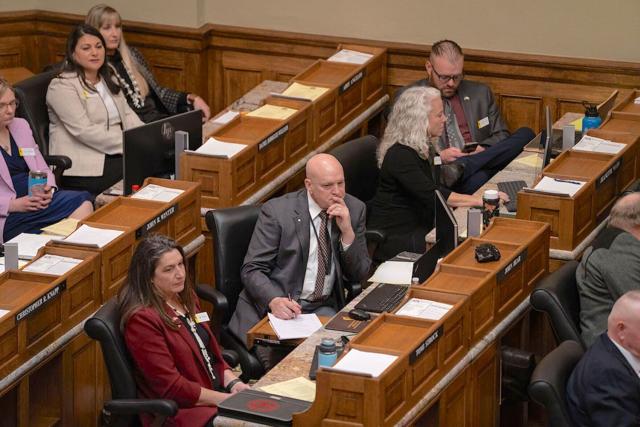In the upcoming 2025 Wyoming legislative session, Rep.-elect Jayme Lien, R-Casper, will continue the efforts of former Rep. Jeanette Ward, R-Casper, to establish a statutory definition of “man” and “woman” through the proposed What is a Woman Act, Wyoming News Now reports.
This bill, which aims to define gender terms based on biological characteristics, was originally introduced by Ward in 2024 but failed to gain the necessary support to pass.
Lien, who recently asked Ward to allow her to carry the bill forward after Ward lost her reelection bid, expressed her commitment to advancing the legislation in the next session.
“I am honored to carry it forward in the 2025 session to allow the Legislature the chance to codify in law what is a woman,” Lien said in a statement.
The What is a Woman Act, now designated as House Bill 32, seeks to establish a legal definition for terms such as “man,” “woman,” “male,” “female,” “father,” and “mother” based on biological terms. Lien emphasized that the bill addresses concerns raised frequently by constituents, particularly regarding the protection of private spaces such as domestic violence shelters, locker rooms, and restrooms. The proposed law aims to protect the health, safety, and privacy of all Wyoming residents, with a focus on maintaining the safety and privacy of women in these spaces.
Lien’s bill has already garnered significant support, with 12 co-sponsors joining her in backing the proposal. The bill is part of a broader legislative push in Wyoming to protect what proponents call “female-only spaces.”
In addition to Lien’s bill, other lawmakers, including Rep. Martha Lawley, R-Worland, are planning to introduce related legislation in 2025. Lawley has announced two bills—one aimed at protecting female-only spaces and another seeking to ban transgender athletes from participating in K-12 and collegiate sports teams. Lawley emphasized that her intent was not to exclude transgender individuals, but to balance the rights of biological women while creating alternative avenues for the transgender community.
The debate over gender identity and spaces for women gained national attention when a legal case in Wyoming centered on the University of Wyoming’s decision to allow a transgender sorority member. This case, which involved the Kappa Kappa Gamma sorority, was dismissed by a US District Judge, and later rejected by the 10th Circuit US Court of Appeals due to jurisdictional issues.
Ward, who first introduced the What is a Woman Act in 2024, argued that legislative action was necessary to address what she described as growing confusion over the definitions of “man” and “woman.” She cited issues like transgender individuals joining sororities and high school girls being required to share spaces with biological males as examples of why the bill was essential.
The bill has sparked significant opposition. Critics, including Wyoming Equality Executive Director Sara Burlingame and Rep. Mike Yin, D-Jackson, have argued that the legislation distracts from more pressing issues facing the state, such as healthcare shortages. Burlingame called the bill a “waste of taxpayer time and money,” while Yin suggested that the state should focus on solving real issues, rather than creating social controversy.
Advocacy groups like the ACLU of Wyoming have expressed concern that such legislation could harm the ability of transgender individuals to live authentically. Antonio Serrano, Advocacy Director at the ACLU of Wyoming, criticized the bill for limiting the ways in which individuals can identify themselves, calling it a harmful effort to stoke political divisions.
As the 2025 general session approaches, the What is a Woman Act remains a topic of debate among Wyoming lawmakers. If passed, it would join other proposed measures in shaping how gender identity and privacy are defined and protected under state law.
The 2025 legislative session begins on January 14.









